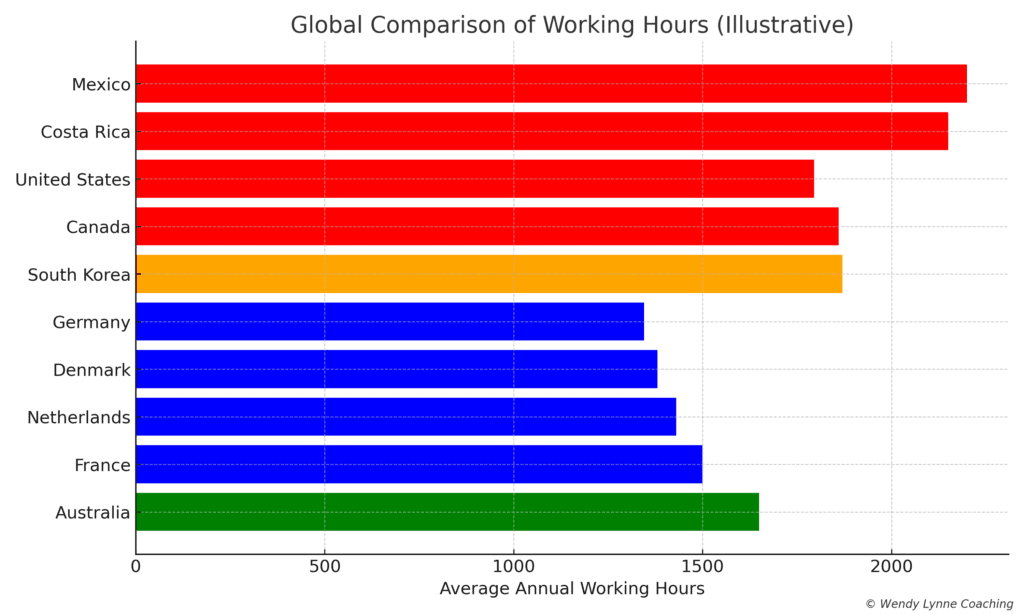AI, Work Culture, and Self Worth: Why Doing Less Feels So Uncomfortable
AI is freeing up our time, but can we feel worthy without working nonstop? Explore how cultural conditioning around hard work impacts self-worth and how coaching helps high achievers reclaim joy, rest, and purpose.
Are We Working Too Much, or Just Trying to Prove Our Self Worth?
In China, the average workweek has climbed to nearly 49 hours. The “996” culture, 9 a.m. to 9 p.m., six days a week, is still deeply entrenched. In countries like Mexico and Costa Rica, annual hours remain among the highest in the world.
But here in the U.S., the problem isn’t just the hours, it’s the emotional identity we’ve built around them.
Growing up, I watched both of my parents run their businesses. They worked six to seven days a week, sometimes late into the night. They were entrepreneurial, self-made, and driven. I admired their work ethic, but I also absorbed an unspoken truth:
This is what success looks like.
And if I wasn’t working?
I felt lost.
Useless.
Like I was falling behind.
Even as an adult, rest didn’t feel relaxing; it felt dangerous. My nervous system was wired for movement, striving, and achieving.
So when I see clients coming to me who are high-performing professionals with no real hobbies, no meaningful rest, and no connection to joy outside of work, I get it.
They may be driven.
But they’re exhausted.
And they’re scared to stop—because they don’t know who they’d be if they did.
How the Five-Day Workweek Was Invented
It’s hard to imagine a world where Friday isn’t the beginning of the weekend—but the five-day, 40-hour workweek is a relatively modern invention.
In 1926, Henry Ford made a radical decision for his time: he reduced his company’s workweek from six days to five without cutting pay. Ford believed shorter workweeks would make employees more productive and also more likely to spend money during their time off. Leisure, rest, and consumption were part of his vision.
This move helped set a new national standard.
After the 1929 stock market crash and mass labor strikes during the Great Depression, President Franklin D. Roosevelt signed the Fair Labor Standards Act in 1938. It created minimum wage laws, mandated overtime pay, and limited the standard workweek to 44 hours—eventually amended in 1940 to 40 hours per week. That’s when the five-day, two-day weekend structure became law in the U.S.
It’s important to remember: the way we work was designed. And anything designed can be redesigned.
Today, countries like the United Arab Emirates, Belgium, and companies across the U.S. and U.K. are experimenting with four-day workweeks. The COVID-19 pandemic forced a global conversation about time, flexibility, and well-being.
And now, AI is pushing the conversation even further.
What AI Frees Up And What It Challenges
AI is giving us tools to do more with less time. From summarizing meetings to writing emails to managing workflows, it’s creating space.
But when space opens up, so does discomfort.
If I’m not working, am I wasting time?
If I don’t feel exhausted, did I even earn my day?
These aren’t questions about productivity; they’re questions about identity. We’ve been conditioned to tie our worth to effort. To believe that rest must be earned and that slowing down is a threat to our success.
The Emotional Cost of Tying Value to Effort
This belief system has a cost – burnout, disconnection, and a subtle, persistent anxiety that we’re never doing enough.
When I work with clients who say, “I can’t stop working, I don’t know what else I’d do,” or “Even on vacation, I feel guilty not checking my email,” what they’re expressing is a fear that without output, they’re not enough.
One of my clients, John, told me he can’t relax unless he’s done something “productive” first. Even on weekends or during downtime, his body won’t fully let go unless he’s earned his rest through effort. What starts as discipline becomes a trap. Rest is allowed, but only after proving he deserves it.
This isn’t laziness. It’s trauma cultural, generational, and deeply personal.
We’ve inherited belief systems that have gone unquestioned for decades. Maybe your parents praised hard work but never modeled rest. Maybe you grew up watching adults who only relaxed when everything was done, and everything was never done. Maybe rest was framed as indulgent, lazy, or something “other people” had time for.
Over time, that conditioning settles into your nervous system. Even when your calendar clears, your mind races. Even when you want to pause, your body doesn’t know how. You feel guilty when you stop, anxious when you slow down, and unsure of your value if you’re not constantly achieving.
This isn’t a mindset flaw. It’s a protective pattern. It helped you survive in environments where being useful earned love, safety, or identity.
But now, it’s exhausting you.
Reclaiming Time, Redefining Worth
Countries like Germany and Denmark have created models where people work less, live well, and still thrive professionally. They’ve learned that productivity and well-being aren’t opposite; they’re partners.
But for those of us raised in a culture of over-efforting, the real work is internal.
It’s learning to be okay when things are quiet.
To rediscover what brings joy when no one is watching.
To stop proving and start living.
Coaching for a New Way of Living
This is the work I do with clients who look successful on paper but feel disconnected, drained, or stuck.
We untangle subconscious beliefs around worth, productivity, and identity.
We help your nervous system feel safe with ease, play, and presence.
We create space for what matters, not just externally, but internally.
Because it’s not about doing less just for the sake of it.
It’s about remembering who you are when you stop performing.
If AI is giving you more time…
What part of you is finally ready to live?
Ready to explore what life could feel like beyond overwork and burnout?
Book a free consultation to discover what’s possible when your life is no longer driven by pressure, but aligned with peace, clarity, and true worth.











Recent Comments